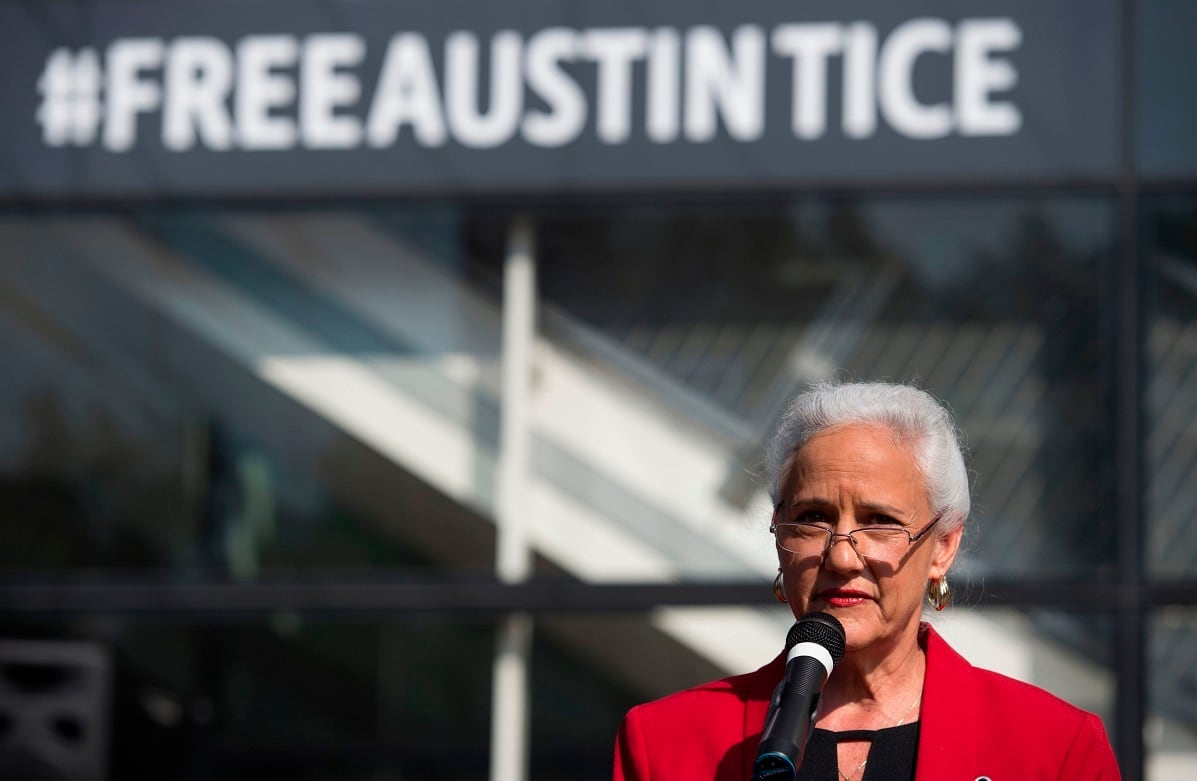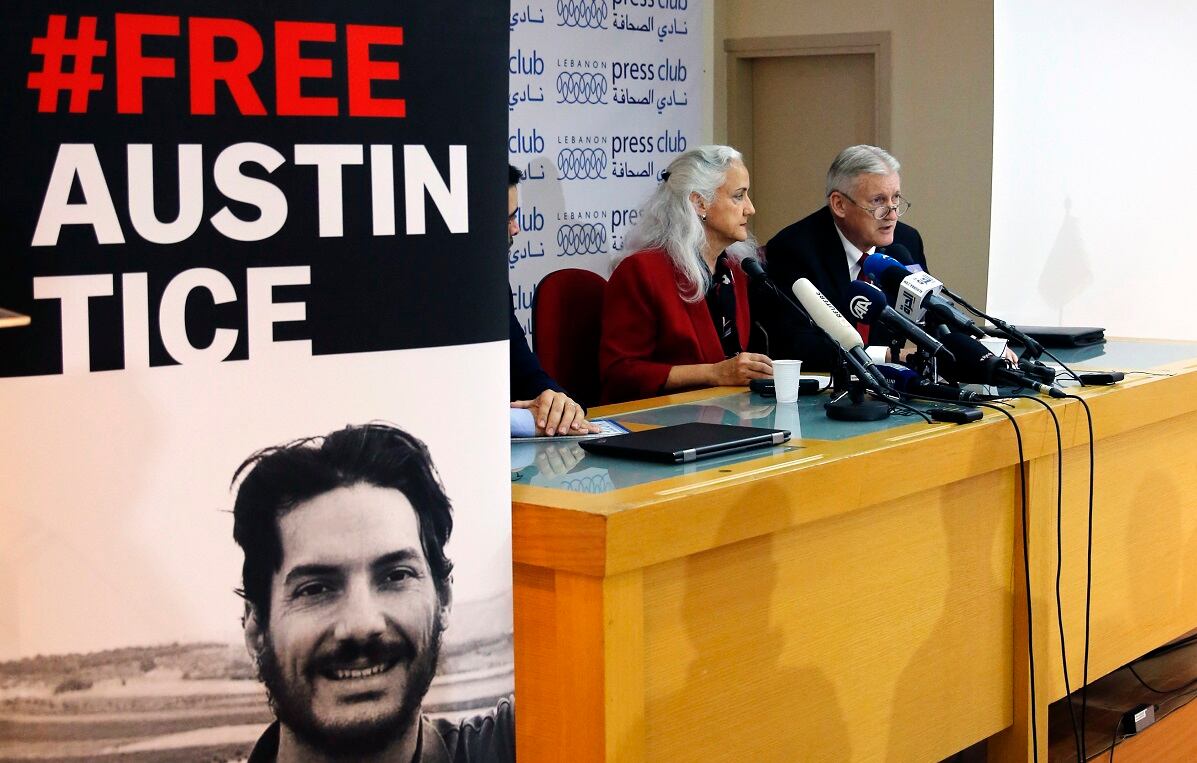WASHINGTON ― The mother of a Marine veteran who has been held hostage in Syria for 11 years has long tired of the secrecy and backroom dealings that leave her and her family in the dark as to the whereabouts and fate of her son Austin Tice.
Debra Tice, 62, has watched the man who controls the White House change from President Barack Obama to President Donald Trump to President Joseph Biden.
All three commanders-in-chief have pledged to bring Austin Tice, 42, home. Thus far, all have failed.
Monday during a panel at the National Press Club in Washington, Debra Tice had a direct message for Biden.
“Mr. President, actions speak louder than words,” Debra Tice said. “Show me.”
“Show Austin that Austin has value to you and to his country. That he is worth bringing home.”
Austin Tice became a Marine officer in 2005 and served multiple Middle East deployments before concluding his time in the Reserve as a captain before attending law school.
While working as a freelance journalist covering the Syrian conflict, he was taken around Aug. 14, 2012.
Austin Tice had reported on a freelance basis for the Washington Post and the McClatchy news organization on the Syrian conflict at the time but was returning to the United States to continue his studies at the Georgetown University Law Center.
Reporting by Sonia Smith, writer-at-large for Texas Monthly, revealed previously unreported information regarding Syrian government overtures to the U.S. government. The Tice family lives in Texas.
Smith reported through an interview with Lebanon’s general security chief, Abbas Ibrahim. Ibrahim told Smith that he brokered a meeting between U.S. Special Presidential Envoy for Hostage Affairs Roger Carstens and Syrian government officials in 2020.
That meeting also was reported by other media outlets.
But what was not known publicly, not even to the Tice family, until Smith’s interview with Ibrahim, was that Syrian officials offered to provide proof of life information about Austin Tice if U.S. government officials would agree to certain conditions.
The exact conditions were not shared with Smith, she said during Monday’s panel, in which she participated remotely.
However, Syrian government officials previously have stated they are calling for the renewal of diplomatic relations and the removal of U.S. troops from Syrian territories.

Both during the press club panel, which focused on journalists being held hostage by foreign governments, and in multiple interviews with Marine Corps Times, Debra Tice pointed to various U.S. hostage scenarios since her son was taken and how those have been handled in very “pragmatic” ways that resulted in those hostages returning home.
The most recent example includes the release of five U.S. citizens from an Iranian jail in exchange for $6 billion of seized Iranian funds. The Americans remain under house arrest in Iran pending the transfer of funds, according to media reports.
Tice pointed to the approach taken by Secretary of State Antony Blinken following the arrest and detention in Russia of professional basketball player Brittney Griner in February 2022 at a Moscow airport on drug charges and detained until December 2022, partially in exchange for notorious Russian arms dealer Viktor Bout.
Blinken confirmed Griner’s detention and publicly discussed offers and processes by which the United States was working to secure her release. Scant information on Austin Tice, after more than a decade, primarily has come from media coverage, not the U.S. government.
While both cases have obvious differences from Austin Tice’s, the Iranian hostages and Griner were acknowledged to be in custody and Tice was working as a freelance journalist while in Syria, both in Debra Tice’s view, were pragmatic and got Americans released.
The U.S. approach with Syria, for Austin Tice, has been anything but pragmatic.
Marine Corps Times reached out to both the White House and U.S. State Department, which handles hostage affairs for the president, in the week ahead of this anniversary.
The White House did not respond.
State department officials provided the following background statement not attributable to an individual member of the department:
“This coming week marks 11 years since journalist Austin Tice was abducted in Syria while he was working to show the world the truth of the brutal Syrian civil war. We call on the Syrian government to ensure Austin Tice and every U.S. national held hostage in Syria is able to return home. The United States is actively pursuing every channel we can to seek his safe return to his family and we will not cease until we bring Austin home. That includes discussing this case with a number of countries in the region.
In order to protect any avenues for progress, we can’t provide details at this time. Sometimes securing the release of a U.S. national requires direct talks with regimes with which we do not ordinarily communicate. SPEHA continues to engage and maintains close coordination with relevant stakeholders across the U.S. government to promote progress on these cases. We will keep working until we see his safe return to the United States,” according to a background, emailed statement from a U.S. State Department staffer.
Statements of this kind make Debra Tice laugh out of exasperation.
Shortly after the Marine veteran was taken, the Tice family was told to not speak publicly about the case, for fear of jeopardizing negotiations.
It was only when the then-Czech Republic ambassador to Syria spoke with Czech media in late August 2012 when public acknowledgement came that Austin Tice had been detained at Syrian checkpoint days before he was scheduled to leave the country.
Five weeks after his capture a 43-second video with footage of Austin Tice in a blindfold and surrounded by armed men on a rocky desert hillside emerged.
For Debra Tice, who has seen a revolving door of government officials tell her they are working on her son’s case, she simply doesn’t care anymore how it gets done, only she sees her son again.
“I’m completely apolitical, whoever gets my son home, that’s my hero.”
Todd South has written about crime, courts, government and the military for multiple publications since 2004 and was named a 2014 Pulitzer finalist for a co-written project on witness intimidation. Todd is a Marine veteran of the Iraq War.




